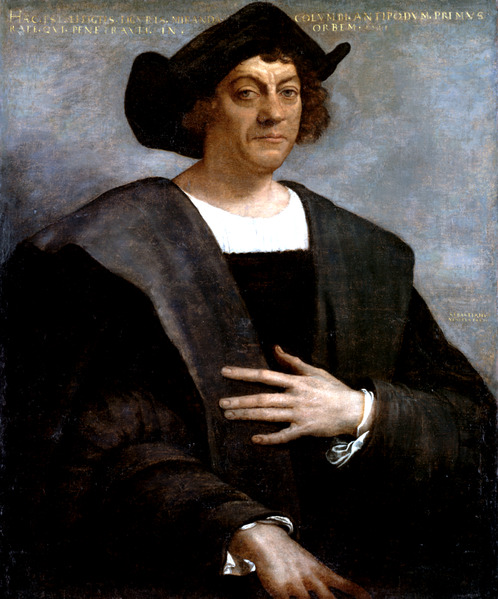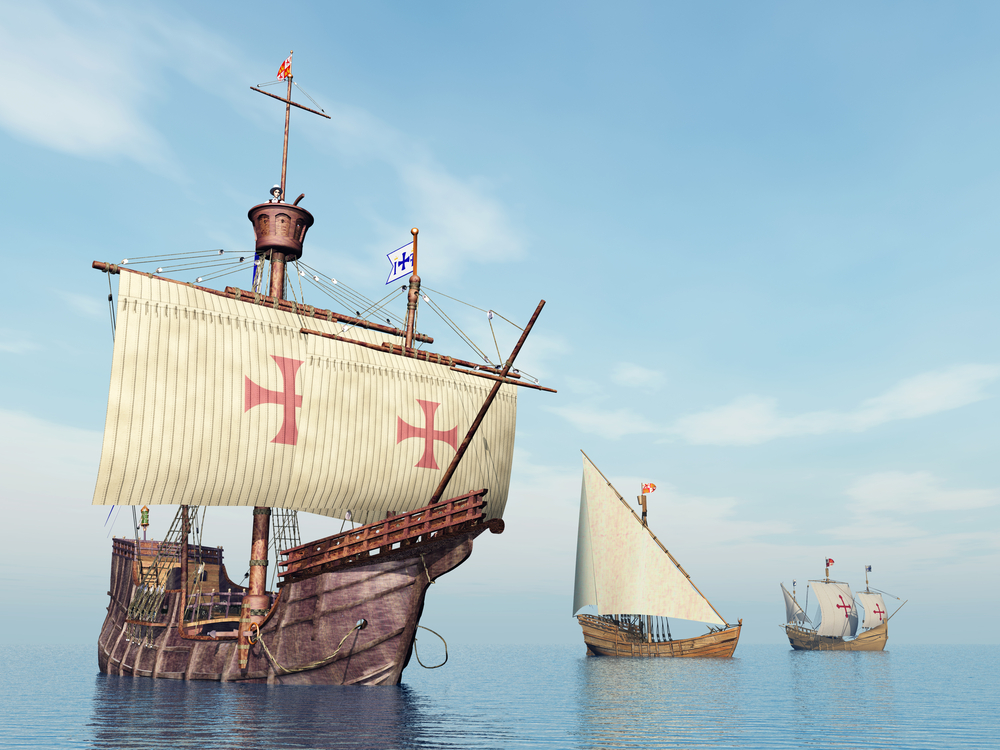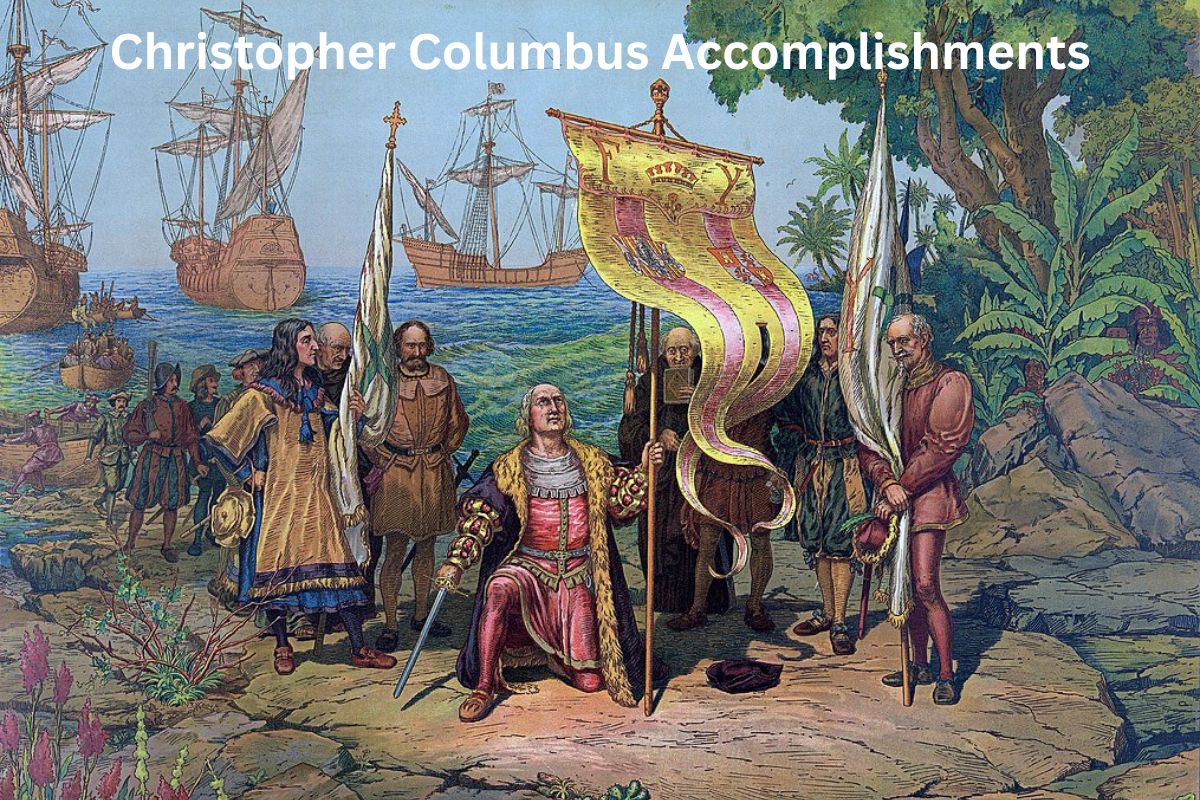Christopher Columbus was an Italian explorer born in Genoa around 1451. He is renowned for his pivotal role in initiating European exploration of the Americas. In 1492, Columbus embarked on a transatlantic voyage under the sponsorship of the Catholic Monarchs of Spain.
He arrived in the Bahamas, mistakenly believing he had reached the Indies. Columbus made subsequent voyages to the Caribbean, exploring various islands and coasts of present-day Central and South America.
His voyages not only opened up new trade routes but also led to the establishment of European colonies in the Americas.
While celebrated as an explorer, Columbus’s legacy is also marked by controversy, as his expeditions had a profound impact on indigenous peoples, resulting in colonization, cultural clashes, and the transatlantic slave trade.
Despite the complexities of his historical legacy, Christopher Columbus’s voyages remain significant milestones in world history.
Accomplishments of Christopher Columbus
1. Transatlantic Voyage in 1492
Christopher Columbus embarked on a momentous journey in 1492, setting sail from Spain with the aim of finding a new route to Asia by sailing westward.
Also Read: Facts About Christopher Columbus
He captained the Santa Maria, along with the Niña and the Pinta, and after a challenging voyage, he reached the Bahamian island of Guanahani on October 12, 1492.
This voyage was the first recorded transatlantic crossing from Europe to the Americas and marked the beginning of a new era of exploration and discovery.
Also Read: Timeline of Christopher Columbus

2. Discovery of the New World
Columbus’s arrival in the Americas is considered a significant milestone in world history. While he mistakenly believed he had reached the Indies, his exploration opened up a new world to Europeans, forever changing the course of history.
Also Read: Facts About the Santa Maria Ship
His voyages led to the discovery of islands and lands in the Caribbean, Central America, and South America, including present-day countries like the Bahamas, Cuba, Haiti, and the Dominican Republic.
This discovery initiated European exploration, colonization, and the eventual formation of European colonies in the New World.
3. Initiation of the Columbian Exchange
One of the far-reaching consequences of Columbus’s voyages was the initiation of the Columbian Exchange. This term refers to the widespread exchange of plants, animals, diseases, and technologies between the Old World and the New World.
Columbus’s voyages introduced European crops like wheat, barley, and grapes to the Americas, while also bringing American crops such as corn, potatoes, and tomatoes to Europe. The exchange of flora and fauna also had profound impacts on the ecosystems of both hemispheres.
Additionally, the introduction of diseases, such as smallpox, had devastating effects on indigenous populations, who lacked immunity to these new illnesses. The Columbian Exchange greatly transformed agriculture, diet, and culture on both sides of the Atlantic.
4. Establishment of permanent colonies in the Americas
Christopher Columbus’s expeditions laid the groundwork for the establishment of permanent European colonies in the Americas. After his initial voyage, Columbus returned to the Americas on subsequent journeys, leading to the establishment of settlements and colonies.
For example, he established La Navidad on the island of Hispaniola (present-day Haiti and the Dominican Republic) during his first voyage. Although La Navidad did not survive, it marked the beginning of European presence in the Americas.
Columbus’s voyages also led to the establishment of other colonies and the eventual colonization of regions such as present-day Puerto Rico and Cuba, which became important Spanish colonies in the Caribbean.

5. Expansion of geographical knowledge
Christopher Columbus’s voyages significantly expanded Europeans’ understanding of world geography. Prior to his explorations, there was a prevailing belief that the Earth was flat, and many feared that sailing too far west would result in falling off the edge of the world.
However, Columbus’s successful crossings of the Atlantic Ocean proved that the Earth was indeed round and opened up new possibilities for maritime exploration. His voyages contributed to the production of new maps and charts, improved navigational techniques, and a greater understanding of global geography.
This expansion of geographical knowledge had far-reaching effects, paving the way for future explorers and navigators.
6. Inspiration for other explorers
Christopher Columbus’s voyages served as a catalyst and inspiration for subsequent explorers. His successful return to Europe and the reports of his discoveries captured the imagination of many individuals, including other explorers and monarchs seeking to expand their empires.
Columbus’s accomplishments encouraged further exploration and led to subsequent expeditions to the Americas. Notable examples include John Cabot’s voyages to North America, Amerigo Vespucci’s explorations in South America, and Ferdinand Magellan’s historic circumnavigation of the globe.
Also Read: Accomplishments of John Cabot
Columbus’s achievements played a pivotal role in launching the Age of Exploration and spurred a wave of European expeditions to various parts of the world.
7. Opening of trade routes between Europe and the Americas
Christopher Columbus’s voyages had a profound impact on global trade. His expeditions opened up direct trade routes between Europe and the Americas, bypassing the previously dominant overland routes through the Middle East.
The discovery of new lands and resources in the Americas sparked a surge in trade between the two continents. European merchants eagerly sought valuable commodities from the New World, such as gold, silver, tobacco, sugar, and exotic goods.
This trade between Europe and the Americas led to economic growth, the establishment of trade networks, and the rise of powerful trading companies, ultimately shaping the development of global trade in the centuries that followed.
8. Cultural exchange between indigenous peoples and Europeans
Christopher Columbus’s voyages initiated a significant cultural exchange between the indigenous peoples of the Americas and Europeans. Upon arriving in the New World, Columbus encountered various indigenous societies with diverse languages, customs, and belief systems.
This encounter led to the exchange of knowledge, ideas, and technologies between the two cultures. Europeans introduced new crops, animals, and technologies to the Americas, while indigenous peoples shared their knowledge of local resources, navigation, and agricultural practices.
However, this exchange was not without conflict and the detrimental effects of colonization, including the introduction of diseases and the displacement of indigenous populations. Nonetheless, this cultural exchange has left a lasting impact on both sides and has influenced art, language, cuisine, and various aspects of contemporary American and European cultures.
9. Influence on European history
Christopher Columbus’s expeditions had a profound influence on European history. His successful voyages and the subsequent colonization of the Americas transformed Europe’s political, economic, and social landscape.
The wealth brought back from the New World, in the form of precious metals and goods, fueled the expansion of European economies and financed future explorations and wars. The discovery of new trade routes also contributed to the rise of powerful nation-states, such as Spain and Portugal, and intensified competition among European powers for dominance in global trade and colonization.
Columbus’s expeditions marked the beginning of European imperialism and had a lasting impact on the course of European history, including the formation of colonial empires and the emergence of the modern world system.
10. Lasting historical legacy
Christopher Columbus’s accomplishments have left a lasting historical legacy. His voyages continue to be widely studied and debated, shaping our understanding of world history, exploration, and the interactions between different cultures.
Columbus is often celebrated as a pioneering explorer who expanded the boundaries of human knowledge and opened up new frontiers. However, his legacy is also marred by controversy, as his arrival in the Americas led to the colonization, oppression, and enslavement of indigenous peoples.
The study of Columbus’s legacy and the ongoing reevaluation of his impact on history contribute to a broader understanding of the complexities and consequences of European exploration and colonialism.
